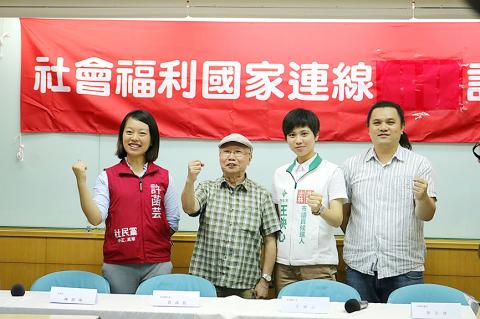The Social Welfare State Front, a coalition of the Social Democratic Party (SDP), Taiwan Radical Wings and the Green Party Taiwan, yesterday said it aims to win at least three councilor seats each in Taipei, Taoyuan, Hsinchu, Tainan and Kaohsiung in the Nov. 24 elections, and to establish united party caucuses in the cities.
The three parties on June 19 founded the front with mediation from former Democratic Progressive Party legislator Chen Zau-nan (陳昭南) to promote their shared platform policies, which include improving public housing, childcare and transportation, and establishing subsidies for start-ups.
The front has candidates in 24 constituencies, Chen said, adding that while the final candidate lists for 20 constituencies have already been determined, those for the remaining four are still being discussed.

Photo courtesy of the Social Welfare State Front
The front is to field one candidate in every constituency, he said.
“If there is more than one candidate, and if no consensus can be reached on who should run in the area, then a primary election would be held in the constituency for local residents to vote for their preferred candidate, but there is also the option of having multiple candidates in one constituency,” Chen said.
The SDP has candidates in five constituencies in Taipei and hopes to have at least three elected in November, said SDP member Hsu Han-yun (許菡芸), who is running for a seat on the Taipei City Council.
The front’s platform would benefit not only Taipei, but also other cities and counties, said Ong Iong-sim (王映心) of the Taiwan Radical Wings, who is also competing for a seat in the Taipei City Council.
“In addition to improving the economy, we should also ensure that wealth is justly distributed. For example, did our salaries increase when GDP growth increased? Instead of being paid more, many were paid less as the wealth gap continues to widen,” Ong said.
The Green Party has councilor candidates in Taoyuan, Jhongli and Hsinchu, and is to nominate more in Hsinchu, party secretary-general Chang Chih-wei (張志偉) said.
The party in 2015 formed the Green-SDP Alliance and hopes to do so again to defeat the New Power Party (NPP), Chang said.
“The NPP has refused to communicate, discuss or negotiate with us. Considering how tough the environment is for minor parties, the NPP, as the most influential minor party, should be more responsible, but if they are unwilling, the Green Party will take up that role,” he said.
The SDP is still considering whether to form an alliance with the Green Party, Hsu said, adding that it also hopes that the NPP would discuss the possibility of collaborating with other minor parties.
The front welcomes any young people who support their platform to join, with the exception of those in the Chinese Nationalist Party (KMT), New Party, People First Party and Chinese Unity Promotion Party, Chen said, adding that he hopes to see more young people with vision replace incompetent politicians from major parties.

The manufacture of the remaining 28 M1A2T Abrams tanks Taiwan purchased from the US has recently been completed, and they are expected to be delivered within the next one to two months, a source said yesterday. The Ministry of National Defense is arranging cargo ships to transport the tanks to Taiwan as soon as possible, said the source, who is familiar with the matter. The estimated arrival time ranges from late this month to early next month, the source said. The 28 Abrams tanks make up the third and final batch of a total of 108 tanks, valued at about NT$40.5 billion

Travel agencies in Taiwan are working to secure alternative flights for travelers bound for New Zealand for the Lunar New Year holiday, as Air New Zealand workers are set to strike next week. The airline said that it has confirmed that the planned industrial action by its international wide-body cabin crew would go ahead on Thursday and Friday next week. While the Auckland-based carrier pledged to take reasonable measures to mitigate the impact of the workers’ strike, an Air New Zealand flight arriving at Taipei from Auckland on Thursday and another flight departing from Taipei for Auckland on Saturday would have to

A group from the Taiwanese Designers in Australia association yesterday represented Taiwan at the Midsumma Pride March in Melbourne. The march, held in the St. Kilda suburb, is the city’s largest LGBTQIA+ parade and the flagship event of the annual Midsumma Festival. It attracted more than 45,000 spectators who supported the 400 groups and 10,000 marchers that participated this year, the association said. Taiwanese Designers said they organized a team to march for Taiwan this year, joining politicians, government agencies, professionals and community organizations in showing support for LGBTQIA+ people and diverse communities. As the first country in Asia to legalize same-sex

MOTIVES QUESTIONED The PLA considers Xi’s policies toward Taiwan to be driven by personal considerations rather than military assessment, the Epoch Times reports Chinese President Xi Jinping’s (習近平) latest purge of the Chinese People’s Liberation Army (PLA) leadership might have been prompted by the military’s opposition to plans of invading Taiwan, the Epoch Times said. The Chinese military opposes waging war against Taiwan by a large consensus, putting it at odds with Xi’s vision, the Falun Gong-affiliated daily said in a report on Thursday, citing anonymous sources with insight into the PLA’s inner workings. The opposition is not the opinion of a few generals, but a widely shared view among the PLA cadre, the Epoch Times cited them as saying. “Chinese forces know full well that